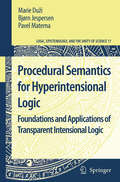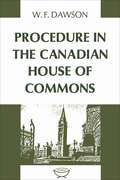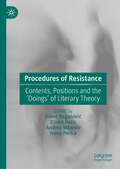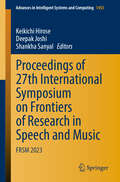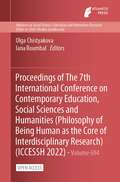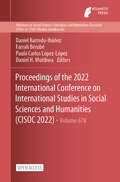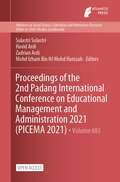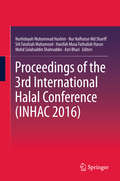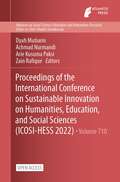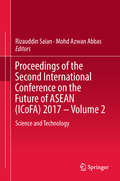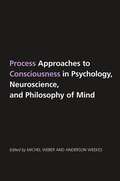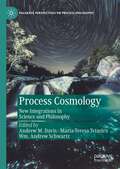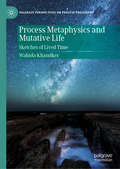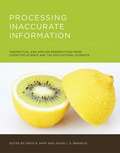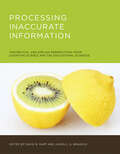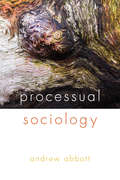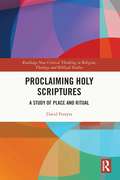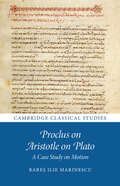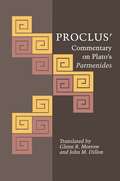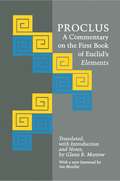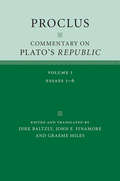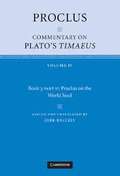- Table View
- List View
Procedural Semantics for Hyperintensional Logic
by Marie Duží Bjorn Jespersen Pavel MaternaThe book is about logical analysis of natural language. Since we humans communicate by means of natural language, we need a tool that helps us to understand in a precise manner how the logical and formal mechanisms of natural language work. Moreover, in the age of computers, we need to communicate both with and through computers as well. Transparent Intensional Logic is a tool that is helpful in making our communication and reasoning smooth and precise. It deals with all kinds of linguistic context in a fully compositional and anti-contextual way.
Procedure in the Canadian House of Commons
by William DawsonProcedure in the Canadian House of Commons is an attempt to survey the whole field of Canadian procedure historically and analytically, to establish what the procedure of the House was in 1867 and to trace its slow development—its evolvement through principles, traditions, rulings, and precedents—to the present time. A particular interest has been taken in depicting how the House operates in practice as compared with how it is believed to operate in theory. Throughout his analysis, Dawson provides insightful criticism and proposals for improvement in the hopes that this book will provide a new perspective on procedure both to those who are caught up in the day-to-day functioning of the House and to those, both in the House and outside it, who are concerned about larger, more distant implications.
Procedures of Resistance: Contents, Positions and the 'Doings' of Literary Theory
by Zrinka Božić Davor Beganović Andrea Milanko Ivana PericaThis volume explores the state of literary theory today, decades after the repeatedly proclaimed end of theory. It builds on the idea that theory is historically constituted as it is “always becoming something else” as Leslie Fiedler claimed in the 1950s, arguing that the historical constitution of theory relies on theory’s procedural nature. In order to assess theory’s procedural challenge to the fundamental notions that all the disciplines within an episteme have brought to the fore, it addresses these questions: What are the procedures theory has relied on? Are they a secret to its resistance, or is resistance its primary procedure? And if so, a resistance to what? Secondly, if resistance were theory’s principal vehicle, at which point does resistance, conceptualized only procedurally (as resisting something, questioning anything, criticizing whatever), display hallmarks of a disciplinary closure that must call for new resistances, and perhapsfor a fundamentally another kind? The book turns to what theory does in order to avoid a partial answer to what theory is.
Proceedings of 27th International Symposium on Frontiers of Research in Speech and Music: FRSM 2023 (Advances in Intelligent Systems and Computing #1455)
by Keikichi Hirose Shankha Sanyal Deepak JoshiThis book features original papers from 27th International Symposium on Frontiers of Research in Speech and Music (FRSM 2023), jointly organized by Sardar Vallabhbhai National Institute of Technology, Surat, India, and Sir C.V. Raman Centre for Physics and Music, Jadavpur University, Kolkata, India, during 4–5 August 2023. The book is organized into four main sections, considering both technological advancement and interdisciplinary nature of speech, music, language and their applications. The first section includes chapters related to computational, modelling and cognitive aspects of the speech signal. The second part contains chapters covering the foundations of both vocal and instrumental music processing with the signal, computational and cognitive aspects. The third section relates to the variety of research being done in the peripheral areas of languages and linguistics with special focus on regional languages of India. A lot of research is being performed within the speech and music information retrieval domain which is potentially interesting for most users of computers and the Internet. Therefore, the fourth and final section is dedicated to the chapters related to multidisciplinary applications of speech and music signal processing.
Proceedings of The 7th International Conference on Contemporary Education, Social Sciences and Humanities (Advances in Social Science, Education and Humanities Research #694)
by Iana Roumbal Olga ChistyakovaThis is an open access book. The aim of the Conference is to provide a shared platform for academics, scholars, PhD students, and graduate students with different cultural backgrounds to present and discuss research, developments and innovations in the fields of contemporary education, social sciences and humanities are referred with the understanding of the Human being.Papers concerning education, philosophy, philosophical anthropology, sociology, theory and history of culture, epistemology, religions, ethics are strongly related with analyzing of the Human being will be considered. Interdisciplinary approach and comparative perspective are encouraged.
Proceedings of the 2022 International Conference on International Studies in Social Sciences and Humanities (Advances in Social Science, Education and Humanities Research #678)
by Daniel H. Mutibwa Paulo Carlos López-López Daniel Barredo-Ibáñez Farrah BérubéThis is an open access book. CISOC’2022 – The 2022 International Conference on International Studies in Social Sciences and Humanities, invites the entire scientific, academic and professional community to present their contributions, which can be written in French, English, Spanish or Portuguese. All papers (full articles) will be submitted to a “double-blind review” by at least two members of the Scientific Committee, based on relevance, originality, importance and clarity. The papers presented must bring discussions on actual theoretical, or methodological, or empirical workshop proposals around Social Sciences and Humanities. The topics proposed for the Conference are related to: Psychology, Education, History, Linguistics and language, Political science, Religious studies, Philosophy, Globalization, Humanities, Archaeology, Anthropology, Inter-cultural studies, Development, Geography, Library and Information Sciences.
Proceedings of the 2nd Padang International Conference on Educational Management and Administration 2021 (Advances in Social Science, Education and Humanities Research #683)
by Sulastri Sulastri Havid Ardi Zadrian Ardi Mohd Izham bin HJ Mohd HamzahThis is an open access book.2nd PICEMA invites academic practitioners, university lecturers and students, independent scholars and researchers to present their research abstracts and papers. Contributions on unpublished results of empirical and experimental research in areas of educational management are cordially invited for presentation. The aims of this conference are: Sharing and discussing critical issues in educational management by stakeholders, lecturers, practitioners, students, researchers or stakeholders.Identifying various policies in the field of education management to produce quality education.Discussing various innovations, practical challenges and the best solutions in education managementGathering scientists and educational experts in scientific forums.Providing some opportunities for innovators to produce various educational technologies.
Proceedings of the 3rd International Halal Conference (INHAC #2016)
by Nurhidayah Muhammad Hashim Nur Nafhatun Md Shariff Siti Fatahiah Mahamood Hanifah Musa Fathullah Harun Mohd Solahuddin Shahruddin Azri BhariThis book contains selected papers which were presented at the 3rd International Halal Conference (INHAC 2016), organized by the Academy of Contemporary Islamic Studies (ACIS), Universiti Teknologi MARA (UiTM) Shah Alam, Malaysia. It addresses halal-related issues that are applicable to various industries and explores a variety of contemporary and emerging issues. Highlighting findings from both scientific and social research studies, it enhances the discussion on the halal industry (both in Malaysia and at the international level), and serves as an invitation to engage in more advanced research on the global halal industry.
Proceedings of the International Conference on Sustainable Innovation on Humanities, Education, and Social Sciences (Advances in Social Science, Education and Humanities Research #710)
by Dyah Mutiarin Achmad Nurmandi Arie Kusuma Paksi Zain RafiqueThis is an open access book.This proceeding consists of research presented in ICOSI UMY, on 20-21 July 2022 at Universitas Muhammadiyah Yogyakarta. The conference covers the topic of governance, international relations, law, education, humanities, and social sciences. The COVID-19 pandemic first time that occurred in 2019, has brought many changes that constrain all countries to adapt quickly. The crisis has shown vulnerabilities and gaps in several primary systems, including healthcare, social protection, education, value chains, production networks, financial markets, and the ecosystem.One of the efforts that each country can take to rise from the COVID-19 pandemic is through strengthening multilateralism, international solidarity, and global partnerships. Hence, this conference raises the central theme “Strengthening Global Partnership for Resilience.” This theme covers sub-themes that allow prospective scholars to submit their papers for ‘Virtual Conferences’ presentation under the following scopes: Social Sciences, Humanities, Educations, and Religious Studies. Presented papers will also get a chance to be published in our remarkable partner publishers. Through the International Symposium on Social, Humanities, Education, and Religious Studies (ISSHERS) and Asian Conference on Comparative Laws (Asian-COL), we hope that participants will express their innovative and creative ideas to provide benefits and contribute knowledge to strengthen global partnerships among countries.Finally, all 75 papers published in this proceedings are expected not only as research output but can be developed further into prototypes or evidence for policy making.
Proceedings of the Second International Conference on the Future of ASEAN (ICoFA) 2017 – Volume 2: Science And Technology
by Rizauddin Saian Mohd Azwan AbbasThis book examines how business, the social sciences, science and technology will impact the future of ASEAN. Following the ASEAN VISION 2020, it analyses the issues faced by ASEAN countries, which are diverse, while also positioning ASEAN as a competitive entity through partnerships. On the 30th anniversary of ASEAN, all ASEAN leaders agreed to the establishment of the ASEAN VISION 2020, which delineates the formation of a peaceful, stable and dynamically developed region while maintaining a community of caring societies in Malaysia, Indonesia, Singapore, Brunei, Vietnam, Thailand, the Philippines, Myanmar, Laos and Cambodia. In keeping with this aspiration, Universiti Teknologi MARA Perlis took the initial steps to organise conferences and activities that highlight the role of the ASEAN region. The Second International Conference on the Future of ASEAN (ICoFA) 2017 was organised by the Office of Academic Affairs, Universiti Teknologi MARA Perlis, to promote more comprehensive integration among ASEAN members. This book, divided into two volumes, offers a useful guide for all those engaged in research on business, the social sciences, science and technology. It will also benefit researchers worldwide who want to gain more knowledge about ASEAN countries
Process Approaches to Consciousness in Psychology, Neuroscience, and Philosophy of Mind (SUNY series in Philosophy)
by Michel Weber Anderson WeekesThis collection opens a dialogue between process philosophy and contemporary consciousness studies. Approaching consciousness from diverse disciplinary perspectives—philosophy, psychology, neuroscience, neuropathology, psychotherapy, biology, animal ethology, and physics—the contributors offer empirical and philosophical support for a model of consciousness inspired by the process philosophy of Alfred North Whitehead (1861–1947). Whitehead's model is developed in ways he could not have anticipated to show how it can advance current debates beyond well-known sticking points. This has trenchant consequences for epistemology and suggests fresh and promising new perspectives on such topics as the mind-body problem, the neurobiology of consciousness, animal consciousness, the evolution of consciousness, panpsychism, the unity of consciousness, epiphenomenalism, free will, and causation.
Process Cosmology: New Integrations in Science and Philosophy (Palgrave Perspectives on Process Philosophy)
by Andrew M. Davis Maria-Teresa Teixeira Wm. Andrew SchwartzThis book newly articulates the international and interdisciplinary reach of Whitehead’s organic process cosmology for a variety of topics across science and philosophy, and in dialogue with a variety historical and contemporary voices. Integrating Whitehead’s thought with the insights of Bergson, James, Pierce, Merleau-Ponty, Descola, Fuchs, Hofmann, Grof and many others, contributors from around the world reveal the relevance of process philosophy to physics, cosmology, astrobiology, ecology, metaphysics, aesthetics, psychedelics, and religion. A global collection, this book expresses multivocal possibilities for the development of process cosmology after Whitehead.
Process Metaphysics and Mutative Life: Sketches of Lived Time (Palgrave Perspectives on Process Philosophy)
by Wahida KhandkerThis book provides a survey of key process-philosophical approaches that, in conversation with selected concepts across the biological and physical sciences, help us to think about living processes, or ‘lived time,’ at different scales of functioning. The first part is written from an opening perspective on the question of the differing scales of analysis provided by Alfred North Whitehead. In particular, his interest in questions arising from the quantum mechanical reconciliation with classical mechanics informs the first two chapters that address problematic categorizations of life as variously ‘despotic,’ ‘invasive,’ or as primitive (in the radically more-than-human case of micro-organisms), whose potential recategorization relies on our willingness to acknowledge changes in value depending on the scale at which we view them. The second part of the book concerns methodologies, in the light of works by Henri Bergson, whose intertwining concerns with epistemology and ontology in his theories of mind and life serve as a model for a process philosophy of biology. The chapters focus on techniques used across philosophy and the sciences to visualize processes that are otherwise unavailable to us due to the limitations of our perceptual faculties, no matter how sophisticated the tools for analysis, from microscopes to telescopes, have become. This book concludes with a consideration of the relations between parts and wholes in process, panpsychist, and ecological terms. It revisits the question of ecological balance and the place of human activities in relation to it, with reference to works of Charles Hartshorne and William James.
Process Tracing
by Andrew Bennett Jeffrey T. CheckelAdvances in qualitative methods and recent developments in the philosophy of science have led to an emphasis on explanation via reference to causal mechanisms. This book argues that the method known as process tracing is particularly well suited to developing and assessing theories about such mechanisms. The editors begin by establishing a philosophical basis for process tracing - one that captures mainstream uses while simultaneously being open to applications by interpretive scholars. Equally important, they go on to establish best practices for individual process-tracing accounts - how micro to go, when to start (and stop), and how to deal with the problem of equifinality. The contributors then explore the application of process tracing across a range of subfields and theories in political science. This is an applied methods book which seeks to shrink the gap between the broad assertion that 'process tracing is good' and the precise claim 'this is an instance of good process tracing'.
Processing Inaccurate Information
by Jason L.G. Braasch David N. RappOur lives revolve around the acquisition of information. Sometimes the information we acquire -- from other people, from books, or from the media -- is wrong. Studies show that people rely on such misinformation, sometimes even when they are aware that the information is inaccurate or invalid. And yet investigations of learning and knowledge acquisition largely ignore encounters with this sort of problematic material. This volume fills the gap, offering theoretical and empirical perspectives on the processing of misinformation and its consequences.The contributors, from cognitive science and education science, provide analyses that represent a variety of methodologies, theoretical orientations, and fields of expertise. The chapters describe the behavioral consequences of relying on misinformation and outline possible remediations; discuss the cognitive activities that underlie encounters with inaccuracies, investigating why reliance occurs so readily; present theoretical and philosophical considerations of the nature of inaccuracies; and offer formal, empirically driven frameworks that detail when and how inaccuracies will lead to comprehension difficulties.ContributorsPeter Afflerbach, Patricia A. Alexander, Jessica J. Andrews, Peter Baggetta, Jason L. G. Braasch, Ivar Bråten, M. Anne Britt, Rainer Bromme, Luke A. Buckland, Clark A. Chinn, Byeong-Young Cho, Sidney K. D'Mello, Andrea A. diSessa, Ullrich K. H. Ecker, Arthur C. Graesser, Douglas J. Hacker, Brenda Hannon, Xiangen Hu, Maj-Britt Isberner, Koto Ishiwa, Matthew E. Jacovina, Panayiota Kendeou, Jong-Yun Kim, Stephan Lewandowsky, Elizabeth J. Marsh, Ruth Mayo, Keith K. Millis, Edward J. O'Brien, Herre van Oostendorp, José Otero, David N. Rapp, Tobias Richter, Ronald W. Rinehart, Yaacov Schul, Colleen M. Seifert, Marc Stadtler, Brent Steffens, Helge I. Strømsø, Briony Swire, Sharda Umanath
Processing Inaccurate Information: Theoretical and Applied Perspectives from Cognitive Science and the Educational Sciences (The\mit Press Ser.)
by Jason L.G. Braasch David N. RappInterdisciplinary approaches to identifying, understanding, and remediating people's reliance on inaccurate information that they should know to be wrong.Our lives revolve around the acquisition of information. Sometimes the information we acquire—from other people, from books, or from the media—is wrong. Studies show that people rely on such misinformation, sometimes even when they are aware that the information is inaccurate or invalid. And yet investigations of learning and knowledge acquisition largely ignore encounters with this sort of problematic material. This volume fills the gap, offering theoretical and empirical perspectives on the processing of misinformation and its consequences.The contributors, from cognitive science and education science, provide analyses that represent a variety of methodologies, theoretical orientations, and fields of expertise. The chapters describe the behavioral consequences of relying on misinformation and outline possible remediations; discuss the cognitive activities that underlie encounters with inaccuracies, investigating why reliance occurs so readily; present theoretical and philosophical considerations of the nature of inaccuracies; and offer formal, empirically driven frameworks that detail when and how inaccuracies will lead to comprehension difficulties.ContributorsPeter Afflerbach, Patricia A. Alexander, Jessica J. Andrews, Peter Baggetta, Jason L. G. Braasch, Ivar Bråten, M. Anne Britt, Rainer Bromme, Luke A. Buckland, Clark A. Chinn, Byeong-Young Cho, Sidney K. D'Mello, Andrea A. diSessa, Ullrich K. H. Ecker, Arthur C. Graesser, Douglas J. Hacker, Brenda Hannon, Xiangen Hu, Maj-Britt Isberner, Koto Ishiwa, Matthew E. Jacovina, Panayiota Kendeou, Jong-Yun Kim, Stephan Lewandowsky, Elizabeth J. Marsh, Ruth Mayo, Keith K. Millis, Edward J. O'Brien, Herre van Oostendorp, José Otero, David N. Rapp, Tobias Richter, Ronald W. Rinehart, Yaacov Schul, Colleen M. Seifert, Marc Stadtler, Brent Steffens, Helge I. Strømsø, Briony Swire, Sharda Umanath
Processual Sociology
by Andrew AbbottFor the past twenty years, noted sociologist Andrew Abbott has been developing what he calls a processual ontology for social life. In this view, the social world is constantly changing--making, remaking, and unmaking itself, instant by instant. He argues that even the units of the social world--both individuals and entities--must be explained by these series of events rather than as enduring objects, fixed in time. This radical concept, which lies at the heart of the Chicago School of Sociology, provides a means for the disciplines of history and sociology to interact with and reflect on each other. In Processual Sociology, Abbott first examines the endurance of individuals and social groups through time and then goes on to consider the question of what this means for human nature. He looks at different approaches to the passing of social time and determination, all while examining the goal of social existence, weighing the concepts of individual outcome and social order. Abbott concludes by discussing core difficulties of the practice of social science as a moral activity, arguing that it is inescapably moral and therefore we must develop normative theories more sophisticated than our current naively political normativism. Ranging broadly across disciplines and methodologies, Processual Sociology breaks new ground in its search for conceptual foundations of a rigorously processual account of social life.
Proclaiming Holy Scriptures: A Study of Place and Ritual (Routledge New Critical Thinking in Religion, Theology and Biblical Studies)
by David H. PereyraThis book provides a comprehensive study on the proclamation of Holy Scriptures as an enacted celebration, as well as its function as a performance within sacralized theatrical spaces. Scripture is integral to religious life within Judaism, Christianity, and Islam, and these traditions have venerated the reading of texts from an appointed place as a sacred act. Thus, the study of how these readings are conducted illuminates some vitally important aspects of this widespread act of worship. Contributing to an underexplored area of scholarship, the book offers an overview of scripture reading in the three Abrahamic faiths and then focuses on where and how the “Word of God” is presented within the Christian tradition. It gathers and summarizes research on the origins of a defined place for the proclamation of holy writings, giving a thorough architectural analysis and interpretation of the various uses and symbols related to these spaces over time. Finally, the listener is considered with a phenomenological description of the place for reading and its hermeneutical interpretation. The material in this book uncovers the contemporary impact of a rich history of publicly reading out scriptures. It will, therefore, be of great interest to scholars of liturgical theology, religious studies, and ritual studies.
Proclus
by Dirk BaltzlyProclus' Commentary on Plato's dialogue Timaeus is arguably the most important commentary on a text of Plato, offering unparalleled insights into eight centuries of Platonic interpretation. This 2007 edition offered the first new English translation of the work for nearly two centuries, building on significant advances in scholarship on Neoplatonic commentators. It provides an invaluable record of early interpretations of Plato's dialogue, while also presenting Proclus' own views on the meaning and significance of Platonic philosophy. The present volume, the third in the edition, offers a substantial introduction and notes designed to help readers unfamiliar with this author. It presents Proclus' version of Plato's account of the elements and the mathematical proportions which bind together the body of the world.
Proclus
by Radek ChlupProclus of Lycia (412-485) was one of the greatest philosophers of antiquity, producing the most systematic version of late Neoplatonic thought. He exercised enormous influence on Byzantine, medieval, Renaissance and German Classical philosophy, ranking among the top five of ancient philosophers in terms of the number of preserved works. Despite this he is rarely studied now, the enormous intricacy of his system making the reading of his treatises difficult for beginners. This book provides the first comprehensive introduction to all the basic areas of Proclus' thought. It carefully guides the reader through his metaphysics, theology, epistemology and theory of evil, as well as his sophisticated philosophy of religion. It also sets Proclus in the historical, social and religious context of late antiquity, offering a synthetic account that will appeal to historians and students of ancient religion.
Proclus on Aristotle on Plato: A Case Study on Motion (Cambridge Classical Studies)
by Rareș Ilie MarinescuThis is a study of Proclus' engagement with Aristotle's theory of motion, with a specific focus on Aristotle's criticism of Plato. It refutes the often-held view that Proclus – in line with other Neoplatonists – adheres to the idea of an essential harmony between Plato and Aristotle. Proclus' views on motion, a central concept in his thought, are illuminated by examining his Aristotelian background. The results enhance our view of the reception and authority of Aristotle in late antiquity, a crucial period for the transmission of Aristotelian thought which immensely shaped the later reading of his work. The book also counteracts the commonly held view that late antique philosophers straightforwardly accepted Aristotle as an authority in certain areas such as logic or natural philosophy.
Proclus' Commentary on Plato's Parmenides
by ProclusThis is the first English translation of Proclus' commentary on Plato'sParmenides. Glenn Morrow's death occurred while he was less than halfway through the translation, which was completed by John Dillon. A major work of the great Neoplatonist philosopher, the commentary is an intellectual tour de force that greatly influenced later medieval and Renaissance thought. As the notes and introductory summaries explain, it comprises a full account of Proclus' own metaphysical system, disguised, as is so much Neoplatonic philosophy, in the form of a commentary.
Proclus: A Commentary on the First Book of Euclid's Elements
by ProclusThe description for this book, Proclus: A Commentary on the First Book of Euclid's Elements, will be forthcoming.
Proclus: Commentary On Plato's Timaeus: Book 3, Part 1, Proclus On The World's Body (Proclus: Commentary on Plato's Republic)
by Dirk Baltzly John Finamore Graeme MilesThe commentary on Plato's Republic by Proclus (d. 485 CE), which takes the form of a series of essays, is the only sustained treatment of the dialogue to survive from antiquity. This three-volume edition presents the first complete English translation of Proclus' text, together with a general introduction that argues for the unity of Proclus' Commentary and orients the reader to the use which the Neoplatonists made of Plato's Republic in their educational program. Each volume is completed by a Greek word index and an English-Greek glossary that will help non-specialists to track the occurrence of key terms throughout the translated text. The first volume of the edition presents Proclus' essays on the point and purpose of Plato's dialogue, the arguments against Thrasymachus in Book I, the rules for correct poetic depictions of the divine, a series of problems about the status of poetry across all Plato's works, and finally an essay arguing for the fundamental agreement of Plato's philosophy with the divine wisdom of Homer which is, on Proclus' view, allegorically communicated through his poems.
Proclus: Volume 4, Book 3, Part 2, Proclus on the World Soul
by Dirk Baltzly ProclusIn the present volume Proclus describes the 'creation' of the soul that animates the entire universe. This is not a literal creation, for Proclus argues that Plato means only to convey the eternal dependence of the World Soul upon higher causes. In his exegesis of Plato's text, Proclus addresses a range of issues in Pythagorean harmonic theory, as well as questions about the way in which the World Soul knows both forms and the visible reality that comprises its body. This part of Proclus' Commentary is particularly responsive to the interpretive tradition that precedes it. As a result, this volume is especially significant for the study of the Platonic tradition from the earliest commentators onwards.
